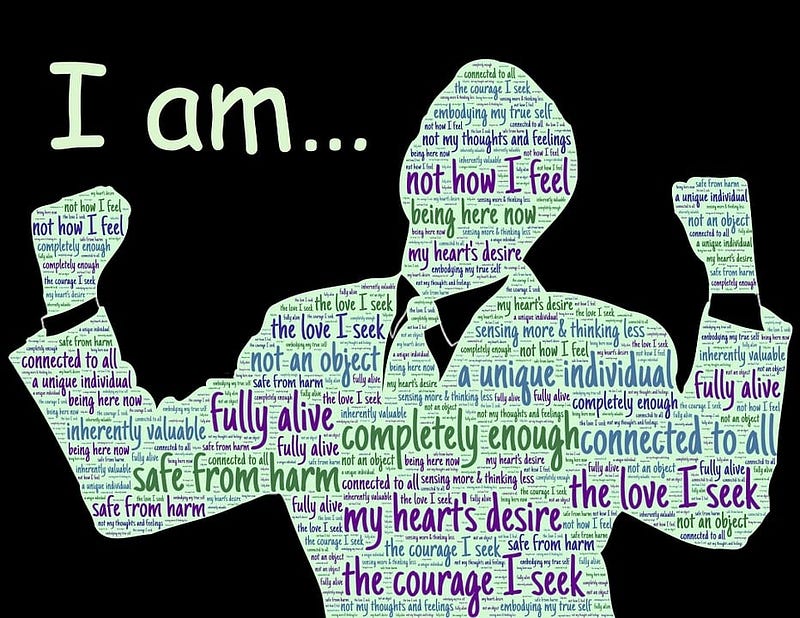Taking a Shower: Identity and Insight into Gender and Sexuality Spectra
I got a nice surprise this morning.


Not because of the “taking a shower” part — I do that at least occasionally — but an insight that occurred during the act of showering. I have written the foundation for my opinion on where gender identity originates through a series of articles, and a comment Christine Penn made on one of them left me thinking. She and I have discussed whether identity is purely biological — the result of chemistry within the physical container of the body. If I understand properly, Christine believes this to be the case. I disagree, and the reason why occurred to me in the shower.
The Boobpiphany
As I stood in the shower considering the origin of identity, I let the water run down over my head, which naturally divided to run over my chest in two rivulets. I have been on estrogen hormone therapy for almost four months, and have begun to develop breasts. The sensation of the water flowing over my new baby breasts was amazing. I could feel my nipples responding to this new bodily configuration and the stimulation the water provided. What really surprised me, however, is that the sensation of the water over my breasts felt simultaneously novel and familiar.
Obviously, the sensation must be novel. The tissue in the new breasts cannot be older than four months. But the sensation was also familiar, as if I knew what it felt like to have water run over my breasts, as if the sensation that was so distinctly feminine had been there in my consciousness, waiting to be expressed when the tissue of my body had been rearranged in a way capable of feeling it.
This sensation made sense; it felt real. It felt more real than many distinctly masculine sensations I have had, and in some regards, I am not a bit surprised. After all, I have known that I am transgender for at least 40 years, even if I never had the word to describe my knowledge or the courage to accept that my knowledge was accurate. The thought that hit me as I pondered the sensation, however, can only be described as an epiphany. No, it is more important than that: it is “The Boobpiphany.”
Why Is Human Behavior the Way It Is?
One of the common arguments today in the conservative narrative is that being gay, lesbian, transgender, nonbinary, etc. is simply a choice. We could prevent ourselves from expressing any of these characteristics if we really wanted to. A restatement of this hypothesis is that humans have the capacity to choose their identity as opposed to express their identity within the confines of the environment. That humans are malleable enough — biochemically, psychologically, socially — to construct whatever person we think would work best for the situation.
This concept of identity plasticity makes the following questions completely valid:
- Why are you transgender? Why would you think you are a woman when you are clearly a man?
- Why are gay or lesbian? Why would you be attracted to people of the same sex when the parts clearly don’t work together?
- Why are you nonbinary? Why would you think you are neither man nor woman when clearly only the binary exists?
But if we can ask those questions and have them make sense, the following questions must also be equally valid:
- Why are you cisgender? Why would you think you are a man when other societies present the concept man in other ways?
- Why are you heterosexual? Why would you be attracted to the opposite sex when there are beautiful people with the same parts as you?
There is no definitive, objective answer to any of these questions. The answer to all of them is “Because I know. I just know. Like Lady Gaga, I was born this way.” There is no arguing with that answer, especially when it is given by a cisgender, heterosexual person.
The Distinction between Subject and Object
Why humans experience life in myriad ways has been considered for centuries. One important conclusion comes from the branch of Indian philosophy called Advaita Vedanta (most recently expressed succinctly by Michael Singer in The Untethered Soul[1]). To answer any of these questions is to consider a different set of questions:
- Who feels the water over the new breasts?
- Who feels that the sensation is familiar?
- Who feels the sense of alignment or mismatch with the body?
- Who feels the attraction for another human?
All of these questions highlight the distinction between the subject that is experiencing and the object that is experienced. Am I the same as the new breasts? No, I cannot be. That would imply that “I” am a different person now than I was four months ago, before the breasts developed. Am I the same as the familiarity with the feminine sensation? No, I cannot be — I had not felt the sensation before, and yet I understood it. Am I the same as alignment or mismatch with the body? No — I feel alignment or mismatch, but I am not the body. Am I the same as the attraction to another man or woman? No — my parts may change, but my sense of what is beautiful will not.
The important point to understand is that the subject observes the object. The two must be different, logically, because one is observing the other. So who is it that observes? The observer is the identity.
The Observing Identity
The identity must be external to the body, as it is capable of observing it. It must be external to the mind, as it is capable of disagreeing with the thoughts that occur. It must be external to society, as it is capable of standing against it. The identity is not chemistry. The identity is not your thoughts. The identity is not the society in which you have grown up. The identity is outside of all of those, and is affected by all of them. While the identity is not created by chemistry, psychology, or society, it must coexist with all of them, because it is present in all of them.
The identity, then, can only be that tiny spark within you that knows. That tiny spark that makes you who you are — no matter where you are, to whom you are speaking, and whether you eat foods that change your body chemistry or take medications that change your hormonal balance. The identity is the piece inside you that cries out from your earliest memories that you are you. When you scream to the world assertions such as:
“I am a transgender woman!”
“I am a gay man!”
“I am a cisgender, heterosexual, Missionary-Position-in-bed-with-lights-off-on-Saturday-Night fraternity brother!”
That is the identity.




